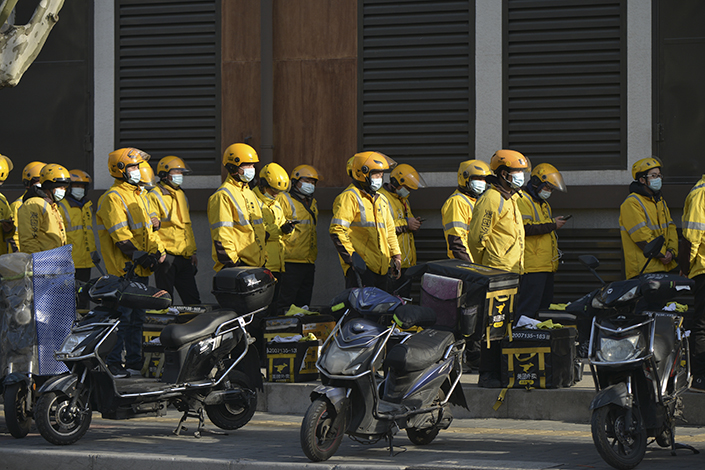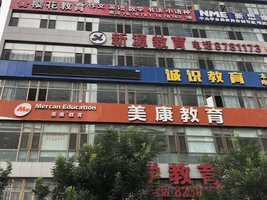Opinion: The Who, What and Why of China’s Regulatory Campaign

Stocks of offshore-listed Chinese companies have slumped recently amid Beijing’s sweeping regulatory actions targeting a range of industries from fintech and ride-hailing to after-school education.
Overseas investors are withdrawing capital across numerous sectors in a panic as they are unsure who will be next following government sanctions against Ant Group Co. Ltd., Didi Global Inc. and New Oriental Education & Technology Group Inc.
1. Here are seven categories of companies that I think are now in the crosshairs of Chinese regulators:
1) Companies that are considered “too big to fail” and ignore or even defy regulations.
What is too big to fail? A company that is large enough to account for a large proportion of the industry and economy, and has the following traits:
· Can cause risk contagion and systemic risks, affecting local economies or other companies in sub-sectors and related industries;
· Has deep connections to the financial system and may trigger systemic risks;
· Has a massive upstream and downstream ecosystem that is linked to large numbers of workers, consumers or end users;
· Has the potential to establish a monopoly through technology, such as an internet platform, whose reach extends beyond real-world physical boundaries.
Such a company would challenge or pose a threat to the government and social governance. If it were to leverage its “too-big-to-fail” status to bolster its creditworthiness to attract more resources and further expand its business to an extent that it could defy regulations, it would become dangerous in the eyes of Chinese regulators.
Of course, such a company would be welcomed if it complies with the law, maintains and asserts mainstream values, and undertakes its corporate social responsibilities. In China, the bigger you are, the more you have to follow the government’s rules. There really are no companies that are “too big to fail” in China and nobody should mistakenly believe they can fly in the face of regulations and the government.
2) Companies that are involved in national security or other security issues.
Beijing is very focused on national security issues nowadays amid a complex international landscape and mounting China-U.S. tensions.
The vast amounts of data collected by tech giant Didi have created data security risks, while its U.S. listing intensified Chinese regulators’ concerns over cross-border data transfers and national security.
It is clear that the central government does not want companies to go public in the U.S. at the moment. This is because after listing in the U.S., they could evade Chinese regulations in the capital market, while continuously disclosing great amounts of regulatory and legal information to U.S. securities watchdogs as they are subject to American regulations.
In order to maintain their listing status, companies will also be directly influenced by U.S. regulators and politics, pursue short-term goals, like quarterly earnings, while providing audit working papers to the U.S. under pressure of expediency amid a deteriorating geopolitical situation.
And finally, they will become “bargaining chips” used by the U.S. to threaten China, putting Beijing at a disadvantage.
Therefore, the Chinese government wants companies seeking to list overseas to choose Hong Kong instead, with the territory serving its intended role as an offshore financial hub for the Chinese mainland.
Data issues are already linked to social and domestic security, and U.S. listings that connect data to national security make them even more sensitive. As this is a concern for Chinese regulators, the government now says it will check data-related issues prior to companies filing for a listing abroad.
3) Companies in certain industries that are closely related to the Chinese people’s livelihood that are subject to China’s overall strategic direction backed by the central government’s top-level values and logic.
The philosophy of governance centers on a series of questions: What role should these industries play in the economy? Do they deal with core resources and uphold social values, fairness and stability? How should they allocate their resources? Should they be coordinated by the government or the market? To what extent should these industries be linked to finance or profit-seeking?
This is why real estate, finance, education and many other industries are subject to tight restrictions and companies in these sectors face certain regulatory risks.
Read more
opinion: China’s Crackdown on After-School Training Reflects Core Philosophies
4) Companies that hurt small and midsize businesses or consumers.
A company whose market dominance allows it to reap unfair benefits or even contravene the rights of midstream and downstream small and midsize businesses or end consumers may now also face regulatory risks.
Chinese regulators now protect the more vulnerable rather than the capital-driven larger players by intensifying the campaign against monopolies, and banning companies from forcing vendors to pick sides or using big-data analysis to price products to the disadvantage of existing customers.
This appears to differ from the tolerance shown by Chinese regulators more than a decade ago for free-wheeling expansion by companies with fewer restrictions.
In fact, the ruling Communist Party’s core values — representing the fundamental interests of the Chinese people — remain the same. But the priority has shifted.
In years past, China’s economy was still in the initial stage of development and needed to prioritize growth. Now, as the economy continues to mature, it’s time to reemphasize the fundamental values and return to the core origins of the party. Businesses and the market need to make themselves aware of this shift.
Seeking to protect the vulnerable is no different from the goals of left-wing parties in the West — including in continental Europe and the U.S.
5) Companies in labor-intensive industries.
Chinese regulators are now increasingly protecting the basic rights of workers, including wage levels, social security benefits, ensuring a safe work environment and maintaining environmental standards.
Observers say that the Chinese government used to favor capital over labor in years past as it pursued development and GDP growth. In the early stages of China’s reform and opening-up, the government focused on boosting employment, increasing income, upgrading the economy’s structure, and improving the country’s overall strength and economic foundation.
But that phase has passed. China now follows the global trend of favoring protection of workers. This is an inevitable trend of social development, and the right thing to do, which should have been done long ago. It is no different from what mainstream left-wing parties in the West have done. In the U.S. and Europe, workers enjoy significant protection, while employers are subject to heavy regulatory restrictions. In many industries in Europe, unions are a very important force that stands up to employers.
China’s policies are now directed at companies that employ a large workforce, such as those in the food delivery industry. Chinese food delivery giant Meituan saw its Hong Kong-traded shares plummet on Monday, as it was ordered to pay social insurance for delivery drivers, threatening to significantly drive up costs.
 |
| Photo: VCG |
6) Companies that produce or deal with content related to culture and ideology.
The issue of ideology has become increasingly important for Chinese regulators amid growing political frictions with the U.S. and social movements in Hong Kong and Taiwan over the past few years.
Now, content distribution involving culture and ideas must fit, conform to and support China’s mainstream political order and ideology, and never cross the line. This leaves such companies facing significant uncertainties regarding policy.
7) Companies that violate traditional morality or values.
If a company goes against traditional or mainstream values and public ethics, and promotes negative values, it may be subject to regulatory restrictions, although the standards for assessment are subjective. However, companies are allowed to continue growing their business after rectifying their mistakes.
Complying with traditional morality and values can be linked to ESG investing. That is, taking into consideration environmental, social and governance factors, alongside financial elements, throughout the investment decision-making process.
2. What China’s regulators don’t want to see
What troubles China’s regulators most are the financial and capital drivers behind companies that may have one, or multiple, “sensitive issues.” The problems of the “disorderly expansion of capital” (an issue highlighted by top policymakers in December), the growth of these companies to a certain size, their listing overseas, and their liberation from government oversight, have combined into a perfect storm.
Regulators’ solution to the problem is to follow their customary practice, cutting the connection between such companies and these financial and capital drivers. This will involve banning them from listing on China’s A-share market or in bourses under the jurisdiction of the China Securities Regulatory Commission, banning A-share listed companies from buying the businesses and assets of these problematic companies, or adding more restrictions or curbs on companies that circumvent regulations and capitalize their businesses and assets. Provided regulatory agencies have a chance to step in ahead of their IPOs, these companies will probably not be able to go public.
Cutting off access to listing and the secondary market will break the chain that links these industries with finance and capital.
The next step will be to bring them all under the supervision of China’s regulators.
The reasons why Didi’s listing shook the regulatory universe was because it touched so many of those “sensitive issues” but the company still decided to rush into an IPO in the U.S. That was undoubtedly the catalyst for the heightened regulatory action we have seen recently which has affected a wide range of industries and Chinese concept stocks.
3. The characteristics of China’s regulators
From my perspective, China’s regulators are…
1) Driven by values and in pursuit of high morals
There will always be a set of values, ethics, and logic behind every political policy.
2) Normative and prescriptive
The idea of supervision is to establish and shape values, set standards, and regulate conduct by formulating rules.
3) Paternalistic and interventionist
The government is the paterfamilias, who bears the ethical responsibility to establish consensus, and strive for the betterment of society. It feels the need to tell its people the best way to improve practices and standards, and to this end it is willing to undertake “necessary intervention” to alter the behavior of society, groups, and individuals.
4) Principle-based rather than rule-based
Regulatory action is based on a set of abstract principles rather than detailed rules that are only the means to an end. The key is therefore to figure out, identify, and comprehend this set of abstract principles.
5) Legal instrumentalists
This system of governance and oversight transcends the law. In that sense, laws and regulations are only tools and means to reach regulators’ goals in terms of governance, norms, and ethics.
The law per se is not the end, merely the tool.
This contrasts starkly with the rule of law concept in the West. While it is comprehensible to Chinese, it is difficult for Westerners to understand. Westerners may find it difficult to understand the logic behind China’s regulations. They always assume that the government aims to “maintain its rule” and curb or restrict the flow of capital for the purpose of “internal stability,” “winning the people’s hearts,” or “boosting its legitimacy.” In other words, Westerners assume that these regulations are tools for China to maintain its rule, but in fact they are driven by values and aim to achieve a higher order and high morals.
4. The views of overseas investors
Investors have several concerns:
1) Whether policies are arbitrary
2) Whether transparency in policymaking will improve
3) Lack of clear boundaries in recent policies
With regard to the above, China watchers, market players, businesspeople, and investors say that no industry is absolutely safe, which spreads fear across the market.
4) Whether there will be a one-size-fits-all approach in policy implementation, application of increasingly stricter standards (for example by lower tiers of government), or damage to innocent players
5) Lack of a transition period
Given the sudden, drastic change in the rules of the game, the lack of a transition period caught many off guard and caused concerns about whether such a change would spread to other industries.
6) Expropriation and insecurity
Most investors follow established and codified rules to formulate strategies and make investment decisions. If rules are clear and investors make the wrong decision or invest illegally, they can accept their losses. But if they have invested in an industry that complied with an existing legal framework but where the rules subsequently changed, they will have a sense of expropriation and being treated unfairly, and will feel uncertain about the future.
7) There is a glass ceiling for non-state-owned enterprises
As companies grow, so do the regulatory risks they are exposed to, and if their expansion is driven by capital, then the problem can become more serious.
Private enterprises will therefore have to change their business model as they expand and increase their market share, because they are likely to draw more regulatory attention and become exposed to greater policy risk. In that sense, there is a kind of insurmountable regulatory ceiling for private enterprises, where the bigger they become, the greater the risk.
As a result, the traditional model of valuation that gives extremely high valuations to Chinese companies may need to change. This is especially true for companies that have already achieved a significant market share and have moved from a high-growth phase into a mature phase.
One exception is Huawei. Its expansion was driven by endogenous growth rather than capital expansion, which gives it a certain degree of validity.
5. The options for overseas investors
The logic I have tried to explain is complicated and many may neither understand it, be willing to spend time researching the issues, nor believe that doing some research will bring about more certainty.
In some cases, investors will choose to withdraw or refrain from investing. On the other hand, if they believe that there is indeed logic to China’s regulations, but still have reservations, they can apply a so-called “China discount” to a company’s valuation to reflect the regulatory pressure and different logic of governance.
For Chinese regulators, the logic goes like this: China needs to regulate and govern those businesses in accordance with its own ethics and governance beliefs. China doesn’t need to bow down to overseas investors when it comes to supervising those “sensitive” industries and companies, and cannot be influenced by them. Otherwise that would allow overseas financial forces to interfere with China’s governance, affect the country’s pursuit of its domestic political, social, economic, and cultural goals, or even violate its sovereignty. The Chinese government will not allow Chinese companies listed in the U.S. to become hostages of the U.S. or allow foreign forces to coerce China and limit its options.
As a result, there is limited room for China’s regulators and foreign investors to intersect.
In this environment, China-concept stocks are inevitably in for a bumpy ride. Investors have suffered losses and even if they can see some of the logic behind China’s governance, they will still have questions that are difficult to get answers to for some time.
Next, Chinese enterprises may well be entering a very cold winter in terms of offshore financing. But that’s a price China’s regulators are likely willing to pay in the interests of governance.
Ren Yi, a graduate of Harvard University’s John F. Kennedy School of Government, is an influential Chinese blogger who has more than 1 million followers on Weibo.
Translated by Luo Meihan and Liao Zhaolong.
This article has been edited for clarity and length.
Contact editors Nerys Avery (nerysavery@caixin.com) and Michael Bellart (michaelbellart@caixin.com)
Download our app to receive breaking news alerts and read the news on the go.
Get our weekly free Must-Read newsletter.

- PODCAST
- MOST POPULAR







 Sign in with Google
Sign in with Google
 Sign in with Facebook
Sign in with Facebook
 Sign in with 财新
Sign in with 财新